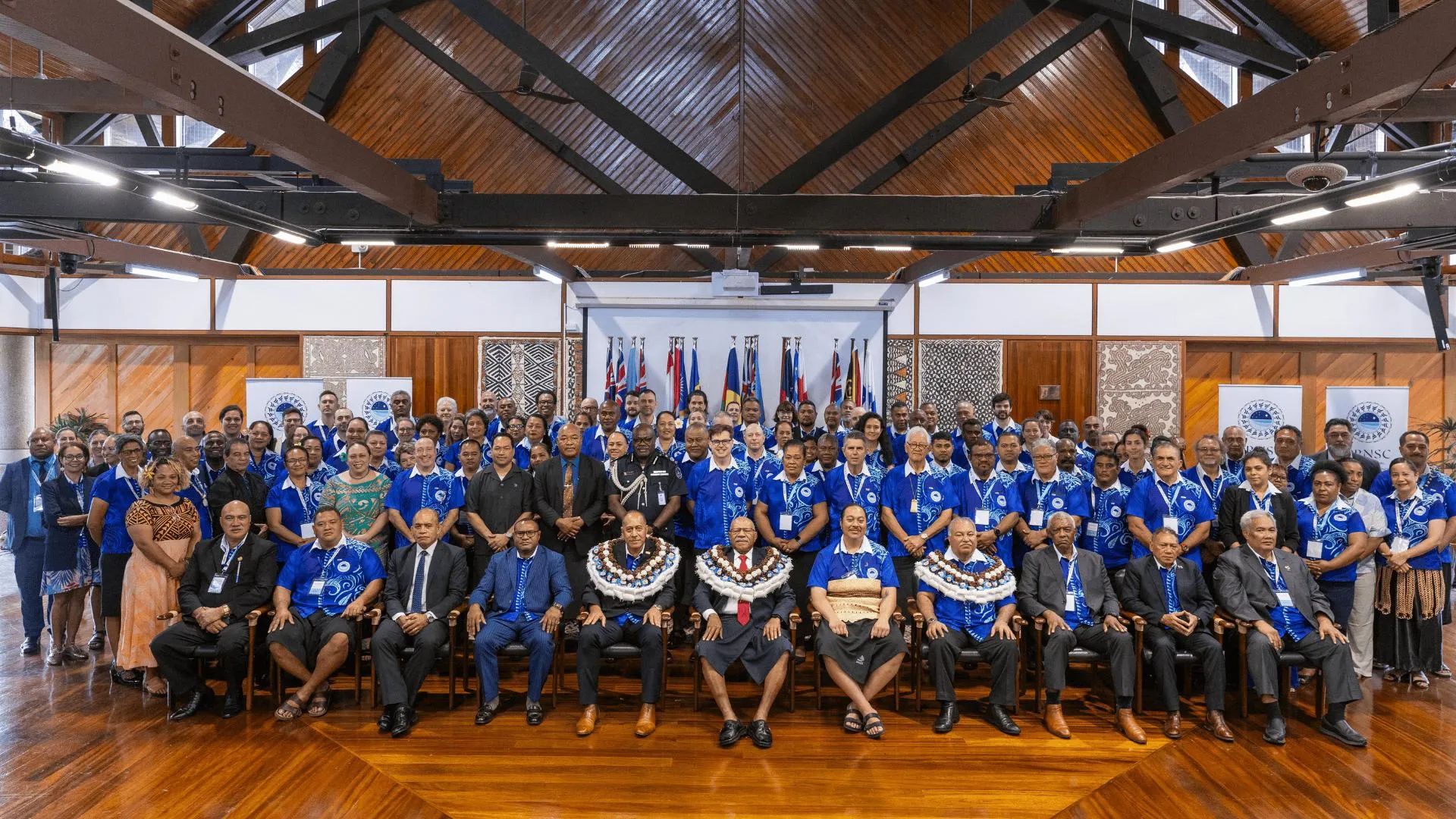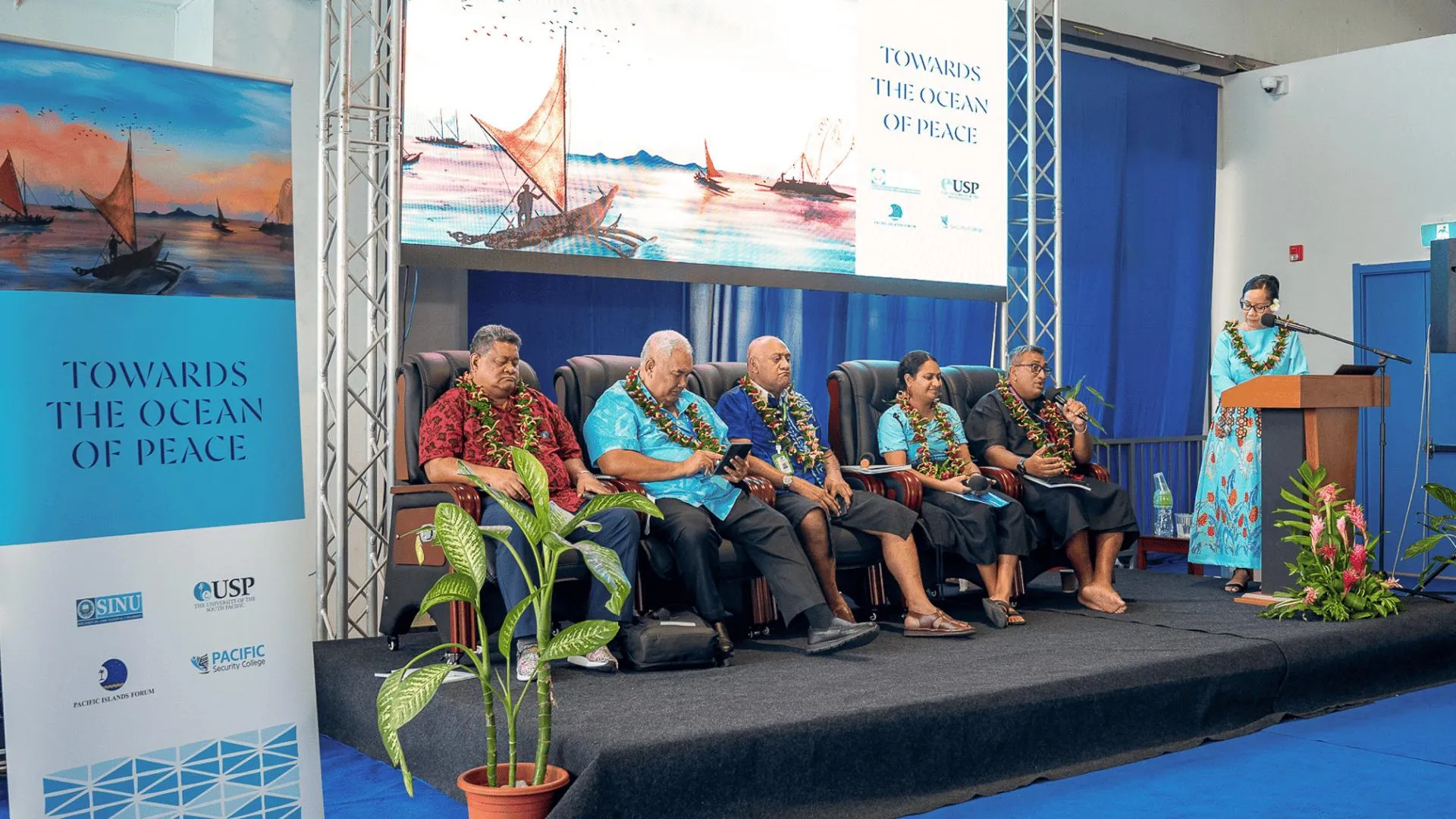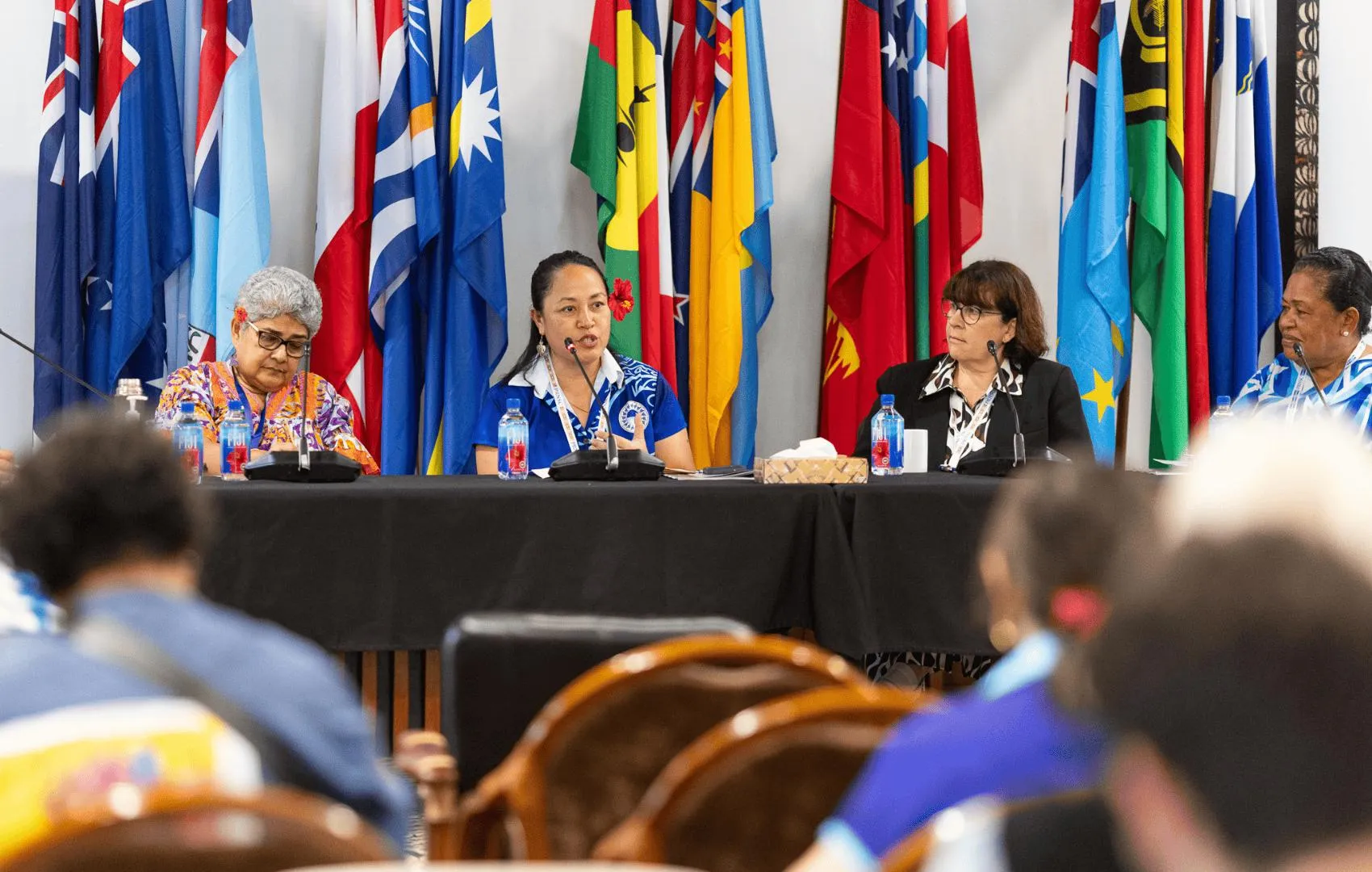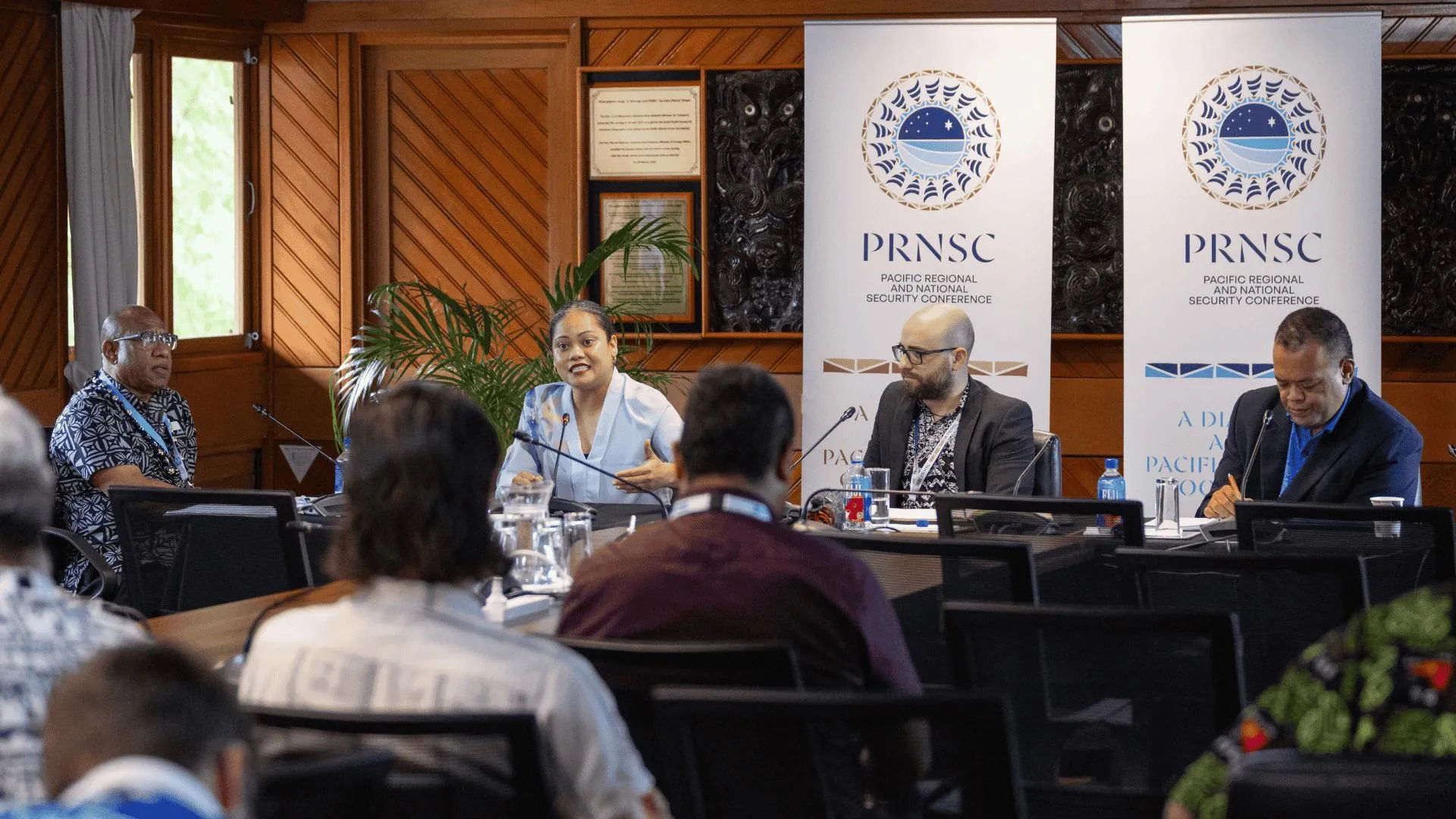PRNSC report captures collective Pacific vision for peace and security to 2050

Delegates at the 2025 Pacific Regional and National Security Conference. Photo: Pacific Security College
The Pacific Security College will this week launch the official report from the 2025 Pacific Regional and National Security Conference (PRNSC), capturing the insights and outcomes from one of the largest gatherings of the Pacific’s security community.
To be released on the sidelines of the 54th Pacific Islands Forum Leaders’ Meeting in Honiara, Solomon Islands, the report highlights how Pacific unity, values, and leadership remain central to addressing the region’s most pressing security challenges.
PRNSC brought together more than 150 delegates, including political representatives, regional officials, civil society leaders, academics, and representatives from Forum Dialogue Partners at the Pacific Islands Forum Secretariat in Suva, Fiji, from 14 to 16 July.
The Prime Minister of Fiji, the Honourable Sitiveni Rabuka, has said the conference is the Pacific’s Shangri-La Dialogue.
“The Pacific Regional and National Security Conference brings together the Pacific security community: political leaders, regional and national officials, academic, business and civil society representatives,” said Professor Dave Peebles, Director of the Pacific Security College.
“The report captures the wisdom of the Pacific security community. Their analysis of the challenges, but also their insights into the solutions.
“It’s a reminder that none of us are on own and a peaceful and prosperous future for the Blue Pacific Continent is there to be won.
“We are grateful to all the partners who made the conference possible.”
The report outlines key insights and recommendations from the conference across a range of security issues, including:
- Pacific-led security: The conference heard regional security efforts must be grounded in Pacific values, owned and driven by Pacific communities, and not externally imposed. People are the region’s greatest strength in maintaining peace and security.
- Urgency of climate action: Climate change is the single greatest threat to Pacific security, the conference was reminded, and the window for adaptation is rapidly closing.
- Combatting transnational crime: The methamphetamine crisis and other forms of transnational crime demand forward-looking, evidence-based national and regional responses. Delegates suggested responses must be cross-sectoral, incorporating public health, law enforcement, and cultural systems.
- Strengthening maritime security: The conference heard maritime security will only grow more important, especially in light of climate impacts, illegal, unreported and unregulated fishing and crime. There was a need, too, to manage different approaches to deep sea mining.
- Inclusive human security: Human security must ensure full societal participation in decision-making and the fulfilment of human rights. Youth, women, persons with disabilities, and civil society must be central to peace and security efforts.
- Cybersecurity and ICT threats: Malicious use of information and communication technology (ICT) poses a growing threat to peace, economic growth, development and human rights. Immediate policy responses, legal reform, infrastructure investment and regional collaboration are essential.
- Cultural and traditional knowledge: Security strategies should draw on traditional knowledge, languages, and spiritual values, while respecting national sovereignty and fostering regional cooperation.
- Gender and social inclusion: The refreshed Boe Declaration Action Plan should embed gender equality, human rights, and cultural protection, and promote inclusive leadership across all sectors.
- Strengthening regional architecture: There is an opportunity to enhance regional security frameworks, including through binding agreements and treaties among Forum member countries.
A central theme of this year’s conference was the vision of an Ocean of Peace – a secure, resilient and united Blue Pacific anchored in Pacific values and collective action.
The report includes outcomes from an interactive futures workshop held on the final day of PRNSC, where delegates imagined a peaceful Pacific by 2050 and identified the decisions needed today to realise that future.
“It’s important we all work together to realise the vision Pacific Islands Forum Leaders have given us in the 2050 Strategy for the Blue Pacific Continent,” said Mr Joel Nilon, Senior Pacific Fellow at the Pacific Security College.
“The futures exercise at the conference was an opportunity to discuss the voyage to ensuring the Pacific is an Ocean of Peace in 2050.
“There’s lots of ideas for what we need to do now, and what we need to do in coming decades, to achieve that vision.
“There is a hunger in people’s hearts for closer regional ties, for more cooperation, so the Pacific is united,” said Mr Nilon.
Insights from the workshop were presented to officials to inform the development of a regional Ocean of Peace Declaration, which is being considered by Forum Leaders in Honiara this week.
The workshop findings reflect both the opportunities and challenges on the path to a peaceful Pacific by 2050. Participants emphasised the importance of collective, regional action to build resilience and empower people across the Pacific, while also recognising the pressures that may disrupt traditional ways of life and shared approaches.
A strong theme was the need to move beyond discussion to concrete implementation – ensuring existing agreements and frameworks deliver real outcomes for the region.
An official launch of the report will be held in Honiara on 11 September, hosted by the Pacific Security College in partnership with the Pacific Islands Forum, Solomon Islands National University and the University of the South Pacific.
Download the 2025 PRNSC report
Read more about the 2025 Pacific Regional and National Security Conference
Official launch event
The Pacific Regional and National Security Conference 2025 Report will be launched on Thursday 11 September at a Pacific Islands Forum Leaders’ Meeting side event.
‘Building an Ocean of Peace through Strengthened Regional Integration’ will be held from 10.30am-11.30am at the Aquatic Centre in Honiara. It is presented by SINU, the Pacific Islands Forum Secretariat, University of the South Pacific, and the Pacific Security College.
The event will include a panel discussion featuring government, regional officials, and civil society representatives. PIFLM registration is required and can be submitted online.


